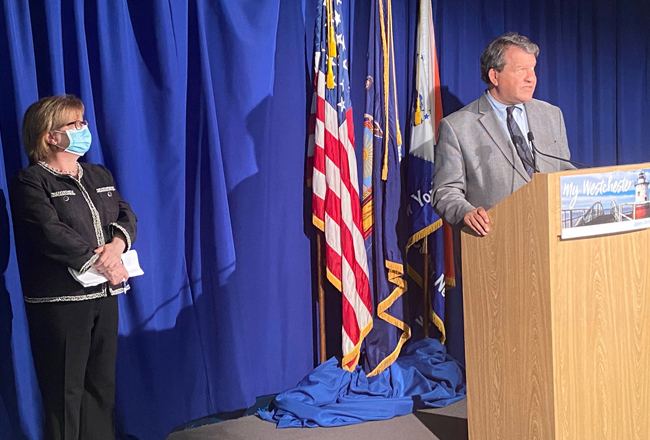Westchester begins reopening: County offers businesses Phase One advice
Business owners and managers in Westchester were urged today to become familiar with operational requirements and the practices they’ll need to employ as the Mid-Hudson Region entered the first phase of the four-phase process for restarting the economy with COVID-19 still active.
Westchester County Executive George Latimer and the county’s Director of Economic Development Bridget Gibbons held a news conference at the County Office Building in White Plains where they discussed details about Phase One and indicated they expected the reopening to smoothly move into Phase Two as planned in two weeks.
Phase One allows the resumption of construction, manufacturing, wholesale trade, retail limited to curbside or in-store pickup or drop off, agriculture, forestry, fishing and hunting.
Gibbons noted that the state’s website forward.ny.gov has full details on the reopening plan including requirements and procedures that must be met by each business.

“Businesses need to take care to follow the detailed guidance that has been provided by the state,” Gibbons said. “For example, employers need to provide PPE (personal protective equipment) for their employees at no cost. So, they have to provide face coverings at no cost. The have to post social distancing markers in the stores, on their construction site, so that people have a visual cue as to how far six feet is and how far they need to stay away from each other.”
She noted that the state said businesses should prohibit nonessential visitors to their locations.
“That doesn’t mean customers. That just means visitors that don’t really have to be there,” Gibbons said. ”Business must limit sharing of objects such as tools, cash registers, all those things used in day-to-day business. If you can isolate a tool to one particular worker that’s good. The employer also must keep a log every day of everyone that enters their place of business.”
She explained that the log must include employees and visitors and would be used in the contact tracing program to help determine who might have been exposed to the virus should an infected person be found to have been on the premises. Businesses also have to develop a reopening safety plan and she said that the state provides a template for that on its website.
She said that it’s important for businesses to follow the guidance from the state and maintain backup documentation as required to verify that they are in compliance. She emphasized that businesses must submit an affirmation to the state via the state’s website that they have read the reopening guidance.
“All of the cranes that you’ve seen that had to stop because they were not considered essential construction projects can now get restarted,” Latimer said. “The men and women that work on those projects, the carpenters, the plumbers, the electricians they go back to work. This starts to employ a particular element of the society: business trades people. People that work with their hands. If they’re unionized or even not unionized they’ve been getting a certain level of compensation that’s very important to them. While much of the economy is a service-based economy you won’t see the benefit of that until you start to open restaurants, bars, things of that nature.”
Gibbons said that in 2019, the Westchester County Industrial Development Agency incentivized $1.6 billion in construction projects.
“Many of those projects were in the works,” Gibbons said. “It’s a very large percentage of the economy here in Westchester and we really look forward to getting the projects restarted.”
Latimer said that while Westchester County is not known as a locale for enormous manufacturing plants it does have numerous smaller plants employing anywhere from a few to dozens of assembly-line workers.
“Those people get to go back to work today. Most of those are folks in blue collar industries. They certainly have been hurting for money. Small businesses have been hurting,” Latimer said.
The Business Journal asked Latimer about how compliance with reopening guidelines would be monitored in view of recent reports from other parts of the country where reopening has happened that showed some businesses were not enforcing social distancing and crowds of people were not using masks and observing other protocols.
“In many parts of this country they have not seen the increase in infections and they haven’t seen the deaths that we have,” Latimer said. “Because we’ve seen those things here I think that is a strong indicator of how people are going to respond. So I think we’re going to get a good response.”
Latimer said that if local police in the normal course of their patrols see crowds or problems at businesses they can use their discretion to deal with situations.
Latimer said that the county has asked the state whether some county IDA, state or federal money could be used to make “zero cost loans” to small businesses to help them with costs associated with reopening such as PPE or signs.
“I think the important thing to recognize is as a government we don’t intend to do for business what they can do best for themselves. We don’t need to tell the business people what to do,” Latimer said.
“We need to be there as an asset for them. They determine what they need and we determine if we can help them in that process if it’s direct financial, whether it’s cutting through some of the red tape, whether it’s redefining whether business A or business B falls under Phase Two or Phase Three. I think we’ll be able to be helpful to them depending on the type of help they need. Some of it may be financial.”